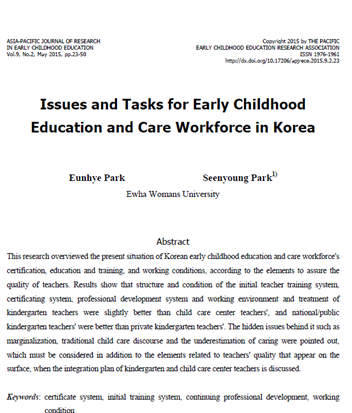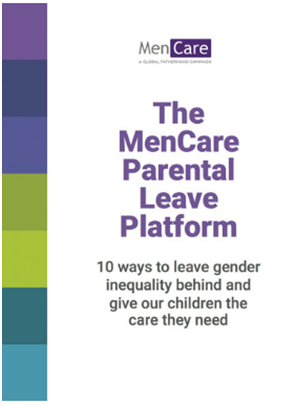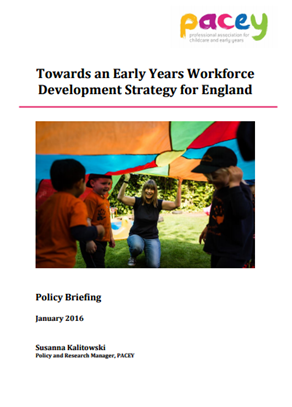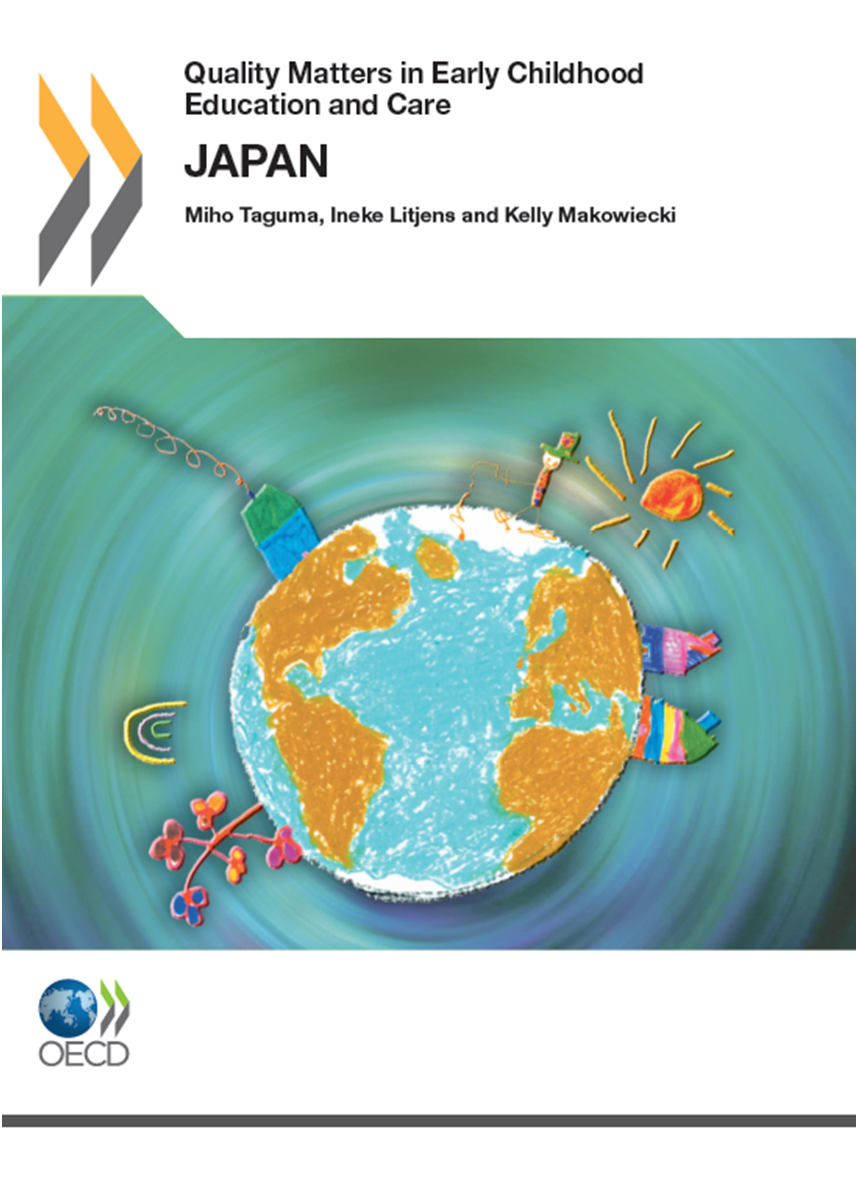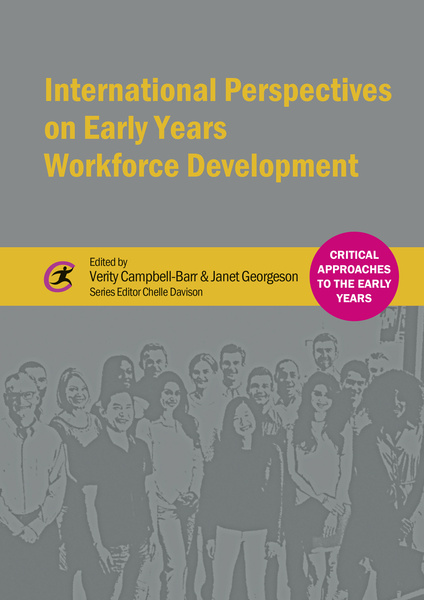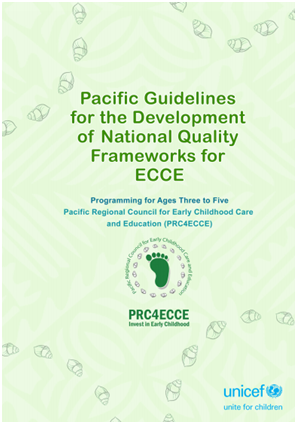Recognition of the profession
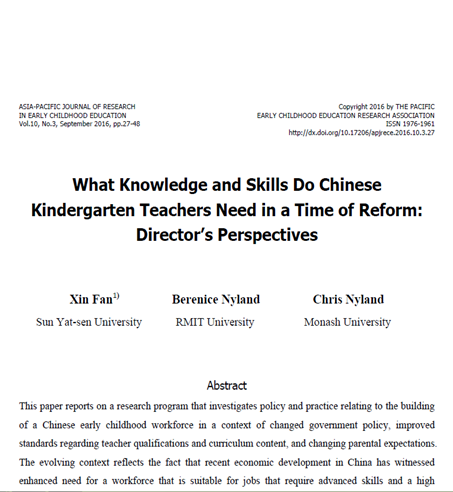
Summary:
This paper reports on a research program that investigates policy and practice relating to the building of a Chinese early childhood workforce in a context of changed government policy, improved standards regarding teacher qualifications and curriculum content, and changing parental expectations. The evolving context reflects the fact that recent economic development in China has witnessed enhanced need for a workforce that is suitable for jobs that require advanced skills and a high capacity to learn. This identified need has brought a renewed interest in early childhood education. Subsequently, policy makers have raised questions regarding what early childhood teachers should know and the skills they need to acquire to be competent practitioners.
The research findings draw on interviews conducted with 24 kindergarten directors from provinces across China. The interview explored opinions about skills and attributes teachers require, level and form of knowledge they need, and how teachers’ capacities might be enhanced.
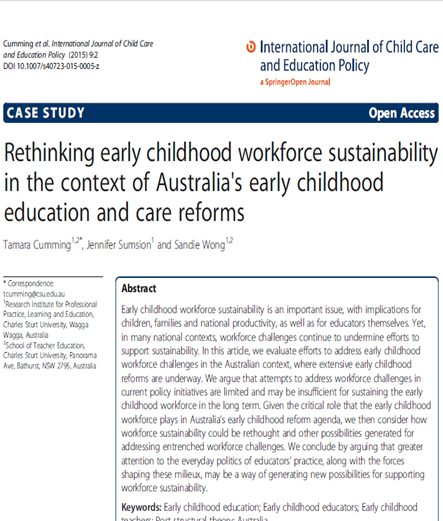
Summary:
Early childhood workforce sustainability is an important issue, with implications for children, families and national productivity, as well as for educators themselves. Yet, in many national contexts, workforce challenges continue to undermine efforts to support sustainability.
In this article, we evaluate efforts to address early childhood workforce challenges in the Australian context, where extensive early childhood reforms are underway. We argue that attempts to address workforce challenges in current policy initiatives are limited and may be insufficient for sustaining the early childhood workforce in the long term. Given the critical role that the early childhood workforce plays in Australia’s early childhood reform agenda, we then consider how workforce sustainability could be rethought and other possibilities generated for addressing entrenched workforce challenges. We conclude by arguing that greater attention to the everyday politics of educators’ practice, along with the forces shaping these milieux, may be a way of generating new possibilities for supporting workforce sustainability.
Summary:
This research overviewed the present situation of Korean early childhood education and care workforce's certification, education and training, and working conditions, according to the elements to assure the quality of teachers. Results show that structure and condition of the initial teacher training system, certificating system, professional development system and working environment and treatment of kindergarten teachers were slightly better than child care center teachers', and national/public kindergarten teachers' were better than private kindergarten teachers'. The hidden issues behind it such as marginalization, traditional child care discourse and the underestimation of caring were pointed out, which must be considered in addition to the elements related to teachers' quality that appear on the surface, when the integration plan of kindergarten and child care center teachers is discussed.
Summary:
The quality and qualifications of the childcare and early years workforce are steadily improving and have never been better. But the sector has reached tipping point, with increasing evidence that early years practitioners are severely under strain.
The public funding environment is set to remain challenging over the next five years. However the substantial investment in early education and childcare that is being made through the Tax-Free Childcare scheme and the doubling of the free childcare entitlement for working families provides a vital opportunity to support workforce development. This briefing makes a series of practical recommendations, many of which do not require additional public funding, which seek to remove barriers to entry and progression and support the sector to retain and make the most of the talented individuals already working in childcare and early years.
Summary:
ECEC professionals’ qualifications and working conditions are inseparably linked to the quality of education and care children receive. This series of reports present why do workforce qualifications, education, training and working conditions matter for better child development. Each of the reports also describe where each of the respective countries (Slovak Republic, Japan and Finland) stand compared to other countries in terms of workforce qualifications, training and working conditions, what are the challenges they face and what strategies have been employed in order to address those challenges.

Summary:
Early Years Workforce Strategy is the early childhood education and care workforce strategy for Australia from 2012 through 2016. It sets out a vision agreed upon by Australian governments, which aims to build and support the early childhood education and care profession. The strategy aims to guide governments, as well as the sector as a whole, to: deliver a sustainable, highly qualified and professional workforce; foster a flexible and responsive workforce capable of identifying and delivering services in response to the needs of children and families; and support ECEC staff to work in a more integrated way with the broader early childhood development (ECD) workforce including the range of professionals that work with children and their families across health and family services. The following five priority areas have been identified as essential components of achieving a sustainable and highly qualified ECEC workforce: 1) a professional workforce; 2) a growing workforce; 3) a qualified workforce; 4) a responsive workforce; and 5) a collaborative workforce.
The strategy which builds on 2009’s Investing in the Early Years –A National Early Childhood Development Strategy, reflects a commitment by governments to address the immediate priorities for the ECEC workforce, and at the same time working towards a long-term broader strategy for the workforce with a focus on supporting more integrated ways of working across the ECD sector.
Commissioned By:
Standing Council on School Education and Early Childhood
Year of Publication:
2012
Summary:
This up to date text is suitable for students on all early years and early childhood courses as well as interested practitioners. It looks at the current structure of the early childhood education and care (ECEC) workforce in different countries, each of which represents a distinct philosophical tradition, tracing what has shaped this structure and examining how politics and policy have moulded the workforce over time. Each chapter analyses historical, philosophical and political developments in the respective country and looks at key theorists, the concepts of childhood that have shaped the workforce and the pedagogical approach. The unique aspects of each country are highlighted along with a consideration of what the future might hold for the workforce. Students and practitioners will achieve a more critical understanding of current practice and the beliefs which underpin particular pedagogical approaches while being encouraged to question their own values and practice.
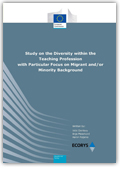
Summary:
This study consolidates the evidence base across the EU28 regarding the diversity of the teaching workforce with regard to migrant and/or minority background. Increasing diversity within the teaching profession is one potential response to the evolving needs of an increasingly multicultural learner population. In particular, the study has: identified and analysed the existing statistical data on the current diversity of the teaching workforce; explored the prevalence of the different barriers to teacher diversity; mapped the policies and initiatives implemented; and, examined the evidence on the effectiveness of the policies. To do so, the study methodology comprised: a literature review drawing on both European and international research; primary research with national experts for the compilation of 28 country profiles; ten in-depth cases studies of policies/initiatives promoting teacher diversity; a comparative analysis of findings; a virtual Policy Delphi; and, two high-level diversity expert seminars. In this executive summary, we set out the main findings and recommendations emerging from the research.




